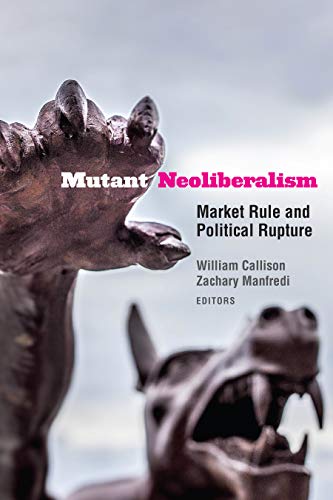

Most ebook files are in PDF format, so you can easily read them using various software such as Foxit Reader or directly on the Google Chrome browser.
Some ebook files are released by publishers in other formats such as .awz, .mobi, .epub, .fb2, etc. You may need to install specific software to read these formats on mobile/PC, such as Calibre.
Please read the tutorial at this link: https://ebookbell.com/faq
We offer FREE conversion to the popular formats you request; however, this may take some time. Therefore, right after payment, please email us, and we will try to provide the service as quickly as possible.
For some exceptional file formats or broken links (if any), please refrain from opening any disputes. Instead, email us first, and we will try to assist within a maximum of 6 hours.
EbookBell Team

4.8
64 reviewsTales of neoliberalism’s death are serially overstated. Following the financial crisis of 2008, neoliberalism was proclaimed a “zombie,” a disgraced ideology that staggered on like an undead monster. After the political ruptures of 2016, commentators were quick to announce “the end” of neoliberalism yet again, pointing to both the global rise of far-right forces and the reinvigoration of democratic socialist politics. But do new political forces sound neoliberalism’s death knell or will they instead catalyze new mutations in its dynamic development?
Mutant Neoliberalism brings together leading scholars of neoliberalism—political theorists, historians, philosophers, anthropologists and sociologists—to rethink transformations in market rule and their relation to ongoing political ruptures. The chapters show how years of neoliberal governance, policy, and depoliticization created the conditions for thriving reactionary forces, while also reflecting on whether recent trends will challenge, reconfigure, or extend neoliberalism’s reach. The contributors reconsider neoliberalism’s relationship with its assumed adversaries and map mutations in financialized capitalism and governance across time and space—from Europe and the United States to China and India. Taken together, the volume recasts the stakes of contemporary debate and reorients critique and resistance within a rapidly changing landscape.
Contributors : Étienne Balibar, Sören Brandes, Wendy Brown, Melinda Cooper, Julia Elyachar, Michel Feher, Megan Moodie, Christopher Newfield, Dieter Plehwe, Lisa Rofel, Leslie Salzinger, Quinn Slobodian **
ReviewThis is the book we need today. The authors refuse to debate about what liberalism ‘is’ and instead take us into the thicket of its fracturing and multiple futures in the wake of the great financial crisis. (Elizabeth Povinelli, Columbia University)
In the debate over what neoliberalism was, whether or not it died, the question of what it morphed into has not been explored. Until now. Callison and Manfredi take up that challenge in this collection of essays by leading scholars... the essays, taken together, provide an extended examination of the possible mutations of neoliberalism that scholars will explore in their future work. ( Choice )
Neoliberalism has frequently been pronounced dead in the wake of the 2008 financial crisis, but the beast lives on. This collection is a strong addition to recent studies of the topic, exploring neoliberalism’s relationships with the EU, the far right, populism, and gender. (Doug Henwood, Producer of Behind the News)
From the Back Cover“Neoliberalism has frequently been pronounced dead in the wake of the 2008 financial crisis, but the beast lives on. This collection is a strong addition to recent studies of the topic, exploring neoliberalism’s relationships with the EU, the far right, populism, and gender.”―Doug Henwood, Producer of Behind the News
“This is the book we need today: the authors refuse to debate about what liberalism ‘is’ and instead take us into the thicket of its fracturing and multiple futures in the wake of the great financial crisis.”―Elizabeth Povinelli, Columbia University
Tales of neoliberalism’s death are serially overstated. Following the financial crisis of 2008, neoliberalism was proclaimed a “zombie,” a disgraced ideology that staggered on like an undead monster. After the political ruptures of 2016, commentators were quick to announce “the end” of neoliberalism yet again, pointing to both the global rise of far-right forces and the reinvigoration of democratic socialist politics. But do new political forces sound neoliberalism’s death knell or will they instead catalyze new mutations in its dynamic development?
Mutant Neoliberalism brings together leading scholars of neoliberalism to rethink transformations in market rule and their relation to ongoing political ruptures. The chapters show how years of neoliberal governance, policy, and depoliticization created the conditions for thriving reactionary forces, while also reflecting on whether recent trends will challenge, reconfigure, or extend neoliberalism’s reach. The contributors reconsider neoliberalism’s relationship with its assumed adversaries and map mutations in financialized capitalism and governance from Europe and the United States to China and India. Taken together, the volume recasts the stakes of contemporary debate and reorients critique and resistance within a rapidly changing landscape.
Contributors : Étienne Balibar, Sören Brandes, Wendy Brown, Melinda Cooper, Julia Elyachar, Michel Feher, Megan Moodie, Christopher Newfield, Dieter Plehwe, Lisa Rofel, Leslie Salzinger, Quinn Slobodian
William Callison is Visiting Assistant Professor of Government and Law at Lafayette College.
Zachary Manfredi is an Equal Justice Works Fellow at the Asylum Seeker Advocacy Project.